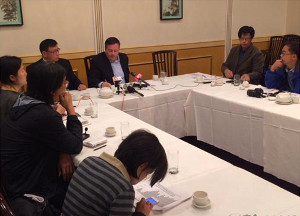
Last week there was a touch of bitterness in the Vancouver media sphere when it was discovered that Conservative Jason Kenney hosted a roundtable meeting for Chinese media only in Richmond.
Kenney is Canada's former immigration minister, and his presentation focused on the government's performance on immigration issues over the last nine years.
With nearly 15 per cent of Vancouver residents identifying a Chinese-language as their mother tongue, the demographic could be key for the Tories' voting efforts in British Columbia.
While not invited, The Tyee obtained an audio recording of the meeting, and it offers a small glimpse into how the Conservatives are framing their immigration efforts to ethnic media this election.
In his presentation, Kenney walked reporters through Canada's immigration numbers over the past nine years under the Conservatives.
He compared the numbers to those nine years prior under the Liberal government, saying they show his party has been the better friend to immigrants.
At one point, Kenney declared the Tories to be the "most pro-immigration party in Canada's history," and possibly in the developed world.
Much of the presentation took aim at the Liberal party's performance on the issue, comparing the number of immigrants allowed into the country over the last 18 years.
Kenney said the average number of new permanent residents increased from 222,000 a year under the Liberals, to 257,000 a year under his party.
Citizenship and Immigration figures show the percentage of new immigrants coming to Canada remained mostly between 0.6 (in 1998 and 1999) and 0.8 per cent of the country's population during the 18-year time frame.
Kenney also highlighted the Conservatives' changes intended to stop illegal immigration and "large scale" human trafficking.
"Essentially what we did was to close the back door that people were using to sneak into the country, while widening the front door of legal immigration," he said.
Threats oversold?
But Kenney may have oversold the threat of illegal immigration, said Sylvia Fuller, an associate professor of sociology at the University of British Columbia.
In his presentation, Kenney touted how the Conservatives have solved immigration problems.
"There was too much abuse of our generosity," he said. "Too many crooked immigration consultants who were exploiting people, too many fake immigration marriages, too many fake refugee asylum claims [and] large scale human smuggling efforts."
But Fuller said she isn't sure all these problems existed before the Conservatives took them on.
For one, she said there's no firm evidence to show that fraudulent marriages or immigration scams are a major problem in Canada.
She added that hammering on immigration fraud can turn public sentiment against immigrants and refugees in unfair ways.
"There seems to be an increased presumption that folks coming to Canada are jumping the queue, [or] are engaged in fraud," she said.
That's leading to changes to the refugee program that are making it harder for legitimate refugees to claim asylum in Canada, she said.
For example, the Immigration and Refugee Board is no longer able to reopen claims after a higher court has ruled on them. Other changes give politicians more freedom to intervene in refugee appeals.
Fuller said the Conservative philosophy presumes refugee claimants have done something wrong and treats them in an "uncompromising" way.
She also pointed out that changes to language requirements for some immigration streams could shut out some immigrants who have weaker English or French skills.
The changes, which set the language proficiency required to qualify for immigration and citizenship at a higher level, will likely impact the Chinese community, she said.
During the question and answer portion of the recording, a journalist pressed Kenney on the language issue.
Kenney defended the stricter policy as one that ensures economic immigrants who do arrive have a better chance of finding employment.
"People who come as economic immigrants with higher levels of English or French language proficiency do better," he said. "They find jobs more quickly, their incomes are higher and their long-term prospects are better." ![]()
Read more: Rights + Justice, Politics, Election 2015, Media














Tyee Commenting Guidelines
Comments that violate guidelines risk being deleted, and violations may result in a temporary or permanent user ban. Maintain the spirit of good conversation to stay in the discussion.
*Please note The Tyee is not a forum for spreading misinformation about COVID-19, denying its existence or minimizing its risk to public health.
Do:
Do not: